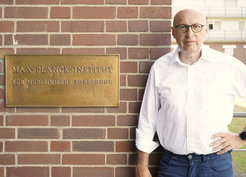Stefan Hell elected to the ‘Orden Pour le Mérite’
The "Ordern Pour le mérite" is awarded for special achievements in the Sciences and Arts and is one of the most prestigious awards in Germany.
On June 18th, 2022, German Nobel laureate Stefan Hell, together with German philosopher Jürgen Habermas, German conductor and musicologist Peter Gülke, and the British architect Sir David Chipperfield, joined the Order ‘Pour le Mérite for Sciences and the Arts’. Professor Hermann Parzinger, the order’s chancellor, announced this on July 22nd of this year. With this election, the director at the Heidelberg Max-Planck Institute for Medical Research rose into the ranks of those entitled to wear the illustrious decoration.
The order’s fellowship has always had strong ties to German history and outstanding individuals of the Arts and Sciences. The decoration was created in 1740 by Prussian king Frederik the Great as an honor for special merit, and initially it was also awarded to non-German, nonmilitary persons. Over the course of time, however, the order’s cosmopolitan character receded. Prussian king Frederik William IV. renewed the nonmilitary tradition by creating a Civil Class in 1842; the naturalist Alexander von Humboldt was the first recipient ‘for achievements in Sciences and the Arts.’

In the era of the German ‘Weimar Republic’, theologian Adolf von Harnack successfully fought to maintain the fellowship’s continuing existence as ‘an independent community of outstanding German scholars and artists’. In 1933, members still included Albert Einstein, Käthe Kollwitz as the first female member of the order, and Ernst Barlach, all of whom were persecuted under the German National Socialists in the following years. Only in 1952, after the end of the National Socialist regime, was the tradition of the order’s fellowship revitalized through the efforts of then Federal President Theodor Heuss. 39 German and 38 foreign members currently make up the order’s fellowship, 15 of whom are Nobel laureates.
Stefan Hell answered some questions about what being awarded the Pour le mérite means for him personally.
Q: Like you, Adolf von Harnack, Albert Einstein and Rudolf Mößbauer were members of the order. Have these scientists had an influence on your intellectual development?
A: They all have played a role in my scientific career, each in their own way. Theologian Adolf von Harnack founded the Kaiser Wilhelm Society. I owe to its successor, the Max Planck Society, my job and the place where I have been able to achieve decisive scientific breakthroughs − partly because the Max Planck Society is guided by the so-called ‘Harnack principle’, that scientists with original ideas should be given the best facilities and free rein instead of rules. From my days as a young student onwards, I have admired Albert Einstein for his steadfast approach to reality. Rudolf Mößbauer’s groundbreaking spectroscopic experiments on the atomic nucleus − which now bear his name − were undertaken as a doctoral student at our very own Institute for Medical Research. It is humbling to be associated with such eminent figures in the history of science.
Q: Many of the order’s current members like Erwin Neher, Christiane Nüsslein-Volhard or Emanuelle Charpentier belong, like you, to the Max Planck Society and are natural scientists. Others − like the writer Hans Magnus Enzensberger − are artists or come from the Humanities, like sociologist and philosopher Jürgen Habermas or Jan and Aleida Assmann. The meetings of the order’s members thus offer an opportunity for truly interdisciplinary exchange. What would you like to talk about with − for example − the writer Herta Müller or the current German Federal President, Frank-Walter Steinmeier?
A: I know both Herta Müller and the Federal President from previous occasions, albeit not very well, and I look forward to seeing them again and indeed meeting them on a regular basis. I have not yet met many of the order’s other members from the Arts, architecture, and the Humanities. These areas are by their very nature shaped by the culture of the time. I am very much looking forward to discovering how these individuals have shaped today’s thinking or whether their thinking has also been viewed critically.
Q: You have received many distinctions – what makes this one special in your eyes?
A: The Pour le mérite has an even longer tradition than the Nobel Prize and is well known not only in Germany but also internationally, especially in the Anglo-Saxon world. As the order includes the Arts, it has enormous significance in our society.
Q: Would you tell us how many medals you own? And on which occasions does one now wear medals at all?
A: I haven’t counted them so far but since you are asking… the ‘Pour le mérite’ is my fourth as far as I recall. At certain events one is expected to wear one’s medals as a mark of respect for the guest or the occasion. Today one rarely ever wears medals. They no longer have the significance that they used to – and maybe that is for the best.
